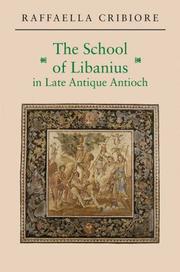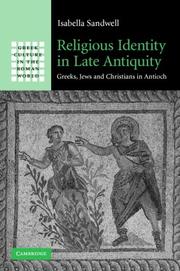| Listing 1 - 5 of 5 |
Sort by
|

ISBN: 9780691128245 0691128243 9786612158117 1282158112 1400827671 9781400827671 Year: 2007 Publisher: Princeton Princeton University Press
Abstract | Keywords | Export | Availability | Bookmark
 Loading...
Loading...Choose an application
- Reference Manager
- EndNote
- RefWorks (Direct export to RefWorks)
This book is a study of the fourth-century sophist Libanius, a major intellectual figure who ran one of the most prestigious schools of rhetoric in the later Roman Empire. He was a tenacious adherent of pagan religion and a friend of the emperor Julian, but also taught leaders of the early Christian church like St. John Chrysostom and St. Basil the Great. Raffaella Cribiore examines Libanius's training and personality, showing him to be a vibrant educator, though somewhat gloomy and anxious by nature. She traces how he cultivated a wide network of friends and former pupils and courted powerful officials to recruit top students. Cribiore describes his school in Antioch--how students applied, how they were evaluated and trained, and how Libanius reported progress to their families. She details the professional opportunities that a thorough training in rhetoric opened up for young men of the day. Also included here are translations of 200 of Libanius's most important letters on education, almost none of which have appeared in English before. Cribiore casts into striking relief the importance of rhetoric in late antiquity and its influence not only on pagan intellectuals but also on prominent Christian figures. She gives a balanced view of Libanius and his circle against the far-flung panorama of the Greek East.
Philosophy --- Sophists (Greek philosophy) --- Philosophie --- Sophistes grecs --- Study and teaching --- History --- Etude et enseignement --- Histoire --- Libanius. --- History. --- Libanius --- Mental philosophy --- Libanios --- Humanities --- Study and teaching&delete& --- Livaniĭ --- Libanio --- Philosophy - Study and teaching - Turkey - Antioch - History.
Book
ISBN: 0801469082 0801452074 1322523096 9780801452079 0801469074 9780801469084 9780801469077 Year: 2013 Publisher: Ithaca
Abstract | Keywords | Export | Availability | Bookmark
 Loading...
Loading...Choose an application
- Reference Manager
- EndNote
- RefWorks (Direct export to RefWorks)
Libanius of Antioch was a rhetorician of rare skill and eloquence. So renowned was he in the fourth century that his school of rhetoric in Roman Syria became among the most prestigious in the Eastern Empire. In this book, Raffaella Cribiore draws on her unique knowledge of the entire body of Libanius's vast literary output-including 64 orations, 1,544 letters, and exercises for his students-to offer the fullest intellectual portrait yet of this remarkable figure whom John Chrystostom called "the sophist of the city."Libanius (314-ca. 393) lived at a time when Christianity was celebrating its triumph but paganism tried to resist. Although himself a pagan, Libanius cultivated friendships within Antioch's Christian community and taught leaders of the Church including Chrysostom and Basil of Caesarea. Cribiore calls him a "gray pagan" who did not share the fanaticism of the Emperor Julian. Cribiore considers the role that a major intellectual of Libanius's caliber played in this religiously diverse society and culture. When he wrote a letter or delivered an oration, who was he addressing and what did he hope to accomplish? One thing that stands out in Libanius's speeches is the startling amount of invective against his enemies. How common was character assassination of this sort? What was the subtext to these speeches and how would they have been received? Adapted from the Townsend Lectures that Cribiore delivered at Cornell University in 2010, this book brilliantly restores Libanius to his rightful place in the rich and culturally complex world of Late Antiquity.
HISTORY --- Ancient / Rome --- Languages & Literatures --- Greek & Latin Languages & Literatures --- Libanius --- Criticism and interpretation. --- Libanios --- Ancient History & Classical Studies. --- Literary Studies. --- Sophistik --- HISTORY / Ancient / Rome. --- Sophisten --- Zweite Sophistik --- Griechenland --- Livaniĭ --- Libanio
Book

ISBN: 3161564375 316151002X Year: 2011 Publisher: Mohr Siebeck
Abstract | Keywords | Export | Availability | Bookmark
 Loading...
Loading...Choose an application
- Reference Manager
- EndNote
- RefWorks (Direct export to RefWorks)
In dieser Schrift wendet sich der bedeutende spätantike Redner Libanios an den römischen Kaiser Theodosius, um seine Unterstützung für den Erhalt heidnischer Tempel zu gewinnen, die von fanatischen Christen bedroht werden. Libanios weist dabei vor allem auf die kulturgeschichtliche und identitätsstiftende Bedeutung der heidnischen Heiligtümer hin.
Religion --- History / Ancient --- Religion / Comparative Religion --- Religion, Primitive --- Atheism --- Irreligion --- Religions --- Theology --- Libanius. --- Livaniĭ --- Libanios --- Libanio --- Philosophie --- Antike Religionsgeschichte --- Textedition --- Editionen, Textausgaben --- Studienliteratur --- Antike --- Religionsgeschichte --- Alte Geschichte --- Antike Philosophie
Book
ISBN: 9782351594872 Year: 1995 Publisher: France : Presses de l'Ifpo,
Abstract | Keywords | Export | Availability | Bookmark
 Loading...
Loading...Choose an application
- Reference Manager
- EndNote
- RefWorks (Direct export to RefWorks)
While Libanios was content to praise the countryside in his teaching and classes, his speeches, firmly linked to everyday life, present reality differently. It is all of these passages that have been the subject of our study and that we have called the discourse of rural realities. Perhaps this crucial point should be emphasized. The real subject of the Lebanese discourse, to which in fact all the information the speaker gives us about the campaign, is the survival of his city and, more importantly, its greatness. These necessarily go through the control of the rural territory of the city.For Libanios, the interdependence between the urban center and the countryside of Antioch is absolute, it constitutes a socio-political and economic system which must remain autonomous, in particular vis-à-vis other political forces which, like the Empire, want to break its unity. Libanios thus perceives his time as a period of transition, a turning point, when the Antiochene moved from one type of social relationship to another. His speeches, better than any other source, reflect the fear of a class losing its prerogatives. Because, precisely, if city and countryside form a compact whole, they remain in fact distinct realities, whose interests diverge and oppose each other. The urban center is the seat of political power, the place of residence of landowners: as such, it has always sought to dominate the countryside.Libanios lives and works during an age of transformation and social conflict. He is aware of it; his protests are those of a member of the ruling class who measures changes in society. Reading his writings, especially his words about land, peasants and agricultural production, one can see the transition from one way of life to another. The speaker of Antioch belongs to a generation which sees, to the detriment of the πόλις, the birth of new social, economic and cultural relations, as well as the definitive transfer of political power to the seat of the Empire.
Languages & Literatures --- Greek & Latin Languages & Literatures --- Libanius --- Livaniĭ --- Libanios --- Libanio --- Criticism and interpretation. --- développement économique --- paysannerie --- histoire économique --- Greek literature. --- Latin literature. --- Roman literature --- Classical literature --- Classical philology --- Latin philology --- Balkan literature --- Byzantine literature --- Greek philology

ISBN: 9780521296915 9780521879156 0521879159 9780511482915 9780511342608 0511342608 0511340966 9780511340963 0511482914 0521296919 1107183758 1281085189 9786611085186 113913325X 0511342071 0511341547 Year: 2007 Publisher: Cambridge, UK New York Cambridge University Press
Abstract | Keywords | Export | Availability | Bookmark
 Loading...
Loading...Choose an application
- Reference Manager
- EndNote
- RefWorks (Direct export to RefWorks)
Studies of religious interaction in the fourth century AD have often assumed that the categories of 'pagan', 'Christian' and 'Jew' can be straightforwardly applied, and that we can assess the extent of Christianization in the Graeco-Roman period. In contrast, in this 2007 text, Dr Sandwell tackles the fundamental question of attitudes to religious identity by exploring how the Christian preacher John Chrysostom and the Graeco-Roman orator Libanius wrote about and understood issues of religious allegiance. By comparing the approaches of these men, who were living and working in Antioch at approximately the same time, she strives to get inside the process of religious interaction in a way not normally possible due to the dominance of Christian sources. In so doing she develops approaches to the study of Libanius' religion, the impact of John Chrysostom's preaching on his audiences and the importance of religious identity to fourth-century individuals.
Identification (Religion). --- Libanius. --- 281.83 --- Identity (Religion) --- Religious identity --- Jacobitische monofysitische Kerk --- Aranyszájú, János, --- Chrysostom, John, --- Chrysostomo, João, --- Chrysostomos, Iō. --- Chrysostomos, Johannes, --- Chrysostomus, Joannes, --- Crisostomo, Giovanni, --- Crisostomo, Juan, --- Crisostomus, Ioannes, --- Giovanni Boccadoro, --- Giovanni Crisostomo, --- Hōhan Oskiaban, --- Hovhan Oskeberan, --- Hovhannēs Oskeberan, --- Iō. --- Ioan Gură de Aur, --- Ioan Zlatoust, --- Ioann Zlatoust, --- Ioannes Crisostomus, --- Iōannēs ho Chrysostomos, --- Ivan Zolotoustyĭ, --- Jan Chryzostom, --- Ján Zlatoústy, --- Jean Bouche d'Or, --- Jean Chrysostome, --- Jehan Bouche d'Or, --- Joan Gojarti, --- Joannes Chrysostomus, --- Joannes Crisostomus, --- João Chrysostomo, --- Johannes Chrysostomus, --- Johannes Goldmund, --- Jovan Zlatoust, --- Juan Crisóstomo, --- Pseudo-Chrysostome, --- Pseudochrysostomus, --- Yoḥanes ʼAfa Warq, --- Yūḥannā al-Dhahabī al-Fam, --- Yūḥannā al-Fam al-Dhahabī, --- Yūḥannā Fam al-Dhahab, --- Zlatoust, Ioan, --- Zlatoust, Jovan, --- Zlatoústy, Ján, --- Ἰωάννης, --- Іван Золотоустий, --- يوحنا الذهبي الفم --- يوحنا فم الذهب، --- 281.83 Jacobitische monofysitische Kerk --- Church history --- Identification (Religion) --- Psychology, Religious --- John Chrysostom, --- Libanios --- John, --- Eglise --- Histoire --- Livaniĭ --- Libanio --- Church history - 4th century. --- John Chrysostom, - Saint, - -407 --- Arts and Humanities --- History
| Listing 1 - 5 of 5 |
Sort by
|

 Search
Search Feedback
Feedback About UniCat
About UniCat  Help
Help News
News